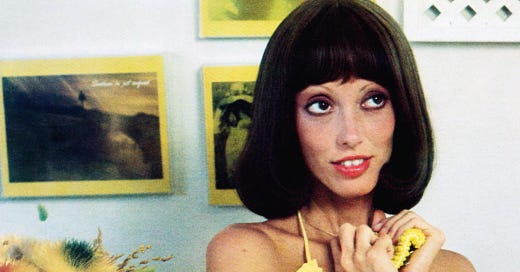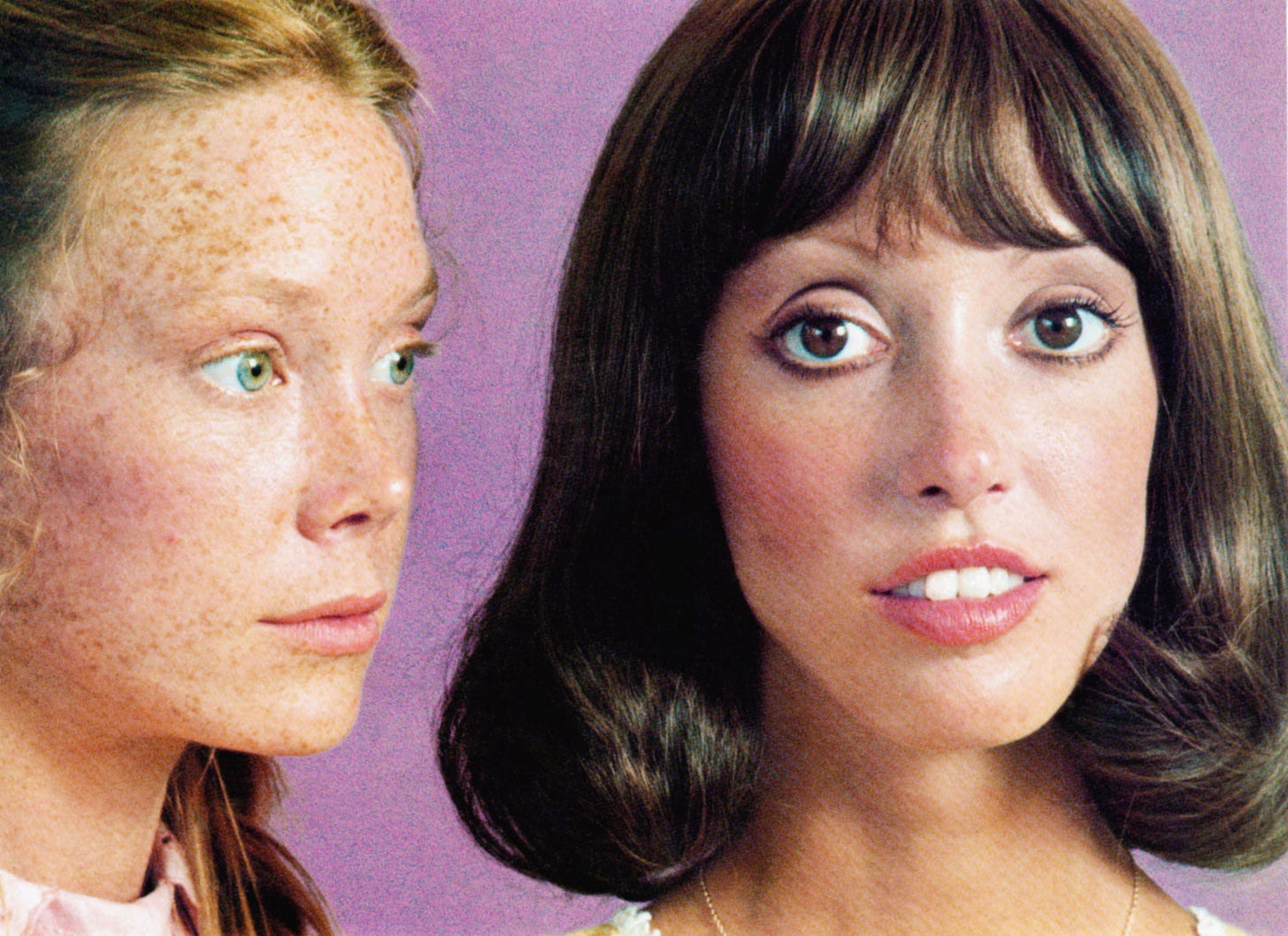The Pink Stuff: Shelley Duvall in ‘3 Women’
Duvall delivered one of her most memorable performances in one of Robert Altman's most experimental films playing a character she helped shape in every way.
Shelley Duvall’s story is as singular as her screen presence. By all accounts, Duvall had no plans to act or any particular interest in film when she met Robert Altman. The two were introduced in 1970 by members of Altman’s Brewster McCloud film crew who’d been taken with the Houston resident after meeting her at a party. Altman then recalls giving her a bit of a hard time, trying to suss out the real person underneath the smiling, effusive, offbeat persona. When he realized Duvall was no put-on, he cast her in the film. Then he cast her again and again, making her a key part of his ensemble during the most productive phase of his career. In 1977, Duvall won the Best Actress trophy at Cannes for 3 Women, the fourth of five movies she made with the director. The distance between Houston and worldwide acclaim proved to be quite short.
Here’s one way to read Duvall’s story: She was plucked from obscurity and molded into a star by a director who saw a quality in her nobody else did, not even herself. But that’s not how Altman saw it. Altman loved actors but he frequently spoke of disliking acting, by which he meant performances that felt like performances rather than human behavior observed by his restless camera. “She was Grandma Moses,” Altman says of Duvall on a commentary track he recorded for 3 Women in 2003. “She was such an untrained, truthful person.” She was not, in other words, clay to be shaped. She was just there, waiting to be found.
No one in movies looked or sounded like Duvall, even in the friendlier-to-funkiness era of the 1970s, but she never gave the same performance twice. She’s achingly vulnerable in Thieves Like Us in 1974 and heartbreakingly narcissistic in Nashville, released the following year. Millie Lammoreaux in 3 Women is nothing like either (or the parts Duvall played in McCabe and Mrs. Miller and Buffalo Bill and the Indians, or Sitting Bull's History Lesson) while containing touches of each. An aide at a rehab facility for the elderly, Millie talks incessantly and lets her face rest in a smile, either blind to or actively ignoring the way others ignore her and talk nastily about her behind her back, when they think of her at all.
Millie dresses in yellow, drives a yellow car, and decorates her apartment at the Purple Sage complex in the same color. It’s as if she’s trying to impose brightness and order on a life that otherwise lacks it. She lives by a routine, dining not with the other aides but at the more expensive hospital cafeteria nearby, where she talks familiarly to single doctors who pay her no more attention than the other Purple Sage residents, swinging singles who always seem to be in the midst of a party to which Millie’s never invited. She sometimes shows up anyway, only to be ignored. It’s as if she’s a ghost haunting her own life.
Millie is an odd object of obsession but becomes one anyway upon the arrival of Pinky (Sissy Spacek), a new employee who takes to copying her opinions and actions and, in time, absorbs even more of her. Pinky is, in Altman’s words, “like an alien who said, ‘How will I hide myself in this world? Oh, I’ll become that person.’” Almost reflexively, Millie’s personality shifts in response to Pinky’s adoration. She becomes embarrassed by her new friend, who follows Millie around like a gosling after becoming her roommate. She’s sharp and condescending. Though Spacek was just a year younger than Duvall, Pinky looks like a child alongside Millie. They’re misfits who don’t so much complete each other as bond into an odd shape of different dimensions.
The completion, if that’s the right word, arrives in the film’s final scene when we see Millie, Pinky and the third woman of the title, Willie (Janice Rule) — who co-owns both the Purple Sage and Dodge City, a crumbling tourist ghost town attraction/bar/shooting range/dirt bike track in the California desert town in which 3 Women is set — appear to have formed a kind of family unit. It’s a mysterious ending to a mysterious film. Altman was inspired to make 3 Women after a dream in which he imagined its title, star, and setting, which he then shaped into a pitch 20th Century Fox agreed to make for a modest budget. (The ‘70s!) Altman was a stylistic outlier in Hollywood and 3 Women is a stylistic outlier in the Altman filmography. Like Images, it bears the unmistakable influence of Ingmar Bergman, especially Persona. What happens often doesn’t literally make sense but it’s not the sort of film in which everything has to make sense. Altman likens it to a watercolor, saying “You want the viewer to look at it and let them make the hard lines.”
It’s the sort of film that risks haziness, or would if Altman didn’t lean so much on his cast to populate it with complex, unmistakably real characters and suggest depths the film never gets to explore fully because no film could. Altman is credited as 3 Women’s writer and director but, even more than the improvisation central to most Altman’s film, 3 Women seems to have been a collaborative work and Millie is very much Duvall’s creation. Altman again:
Her diary entries in the film and her recipes and all that stuff—her shopping lists and the things that she did and talked about—her makeup, her lipstick, her fantasy about how the boys all were after her when obviously none of them wanted to get near her. That all came from her. And that diary of hers is just terrific. I couldn’t have done it and I don’t know a writer who could have done it as well as Shelley did.”
Duvall plays Millie as a soul laid bare. Millie has a sense of her own identity — stylish, popular, elegant, known for her dinner parties, shaped by the magazines and advertisements that fill her mailbox and line her walls — that she determinedly holds onto despite a world that offers no evidence to support it. Each time she climbs into her car — a Ford Pinto, a punchline from the moment it rolled off the assembly line — she leaves her dress hanging out the door. She insists a fellow resident who doesn’t even respond to her hellos wants to go out with her but she won’t have anything to do with him until he gets over his cold. She details the recipe for making a tuna melt as if unlocking the secrets of the universe.
She’d be pitiable, and only pitiable, were it not for the dignity Duvall brings to the role. In Duvall’s hands, Millie seems only a touch more delusional than anyone else who has an idea of themselves whose realization life seems to undermine with annoying frequency — which is to say just about everyone. She demands empathy, not scorn. She’s too human, and too much like us, to be a joke.
“It’s what I call ‘the pink stuff.’,” Altman says. “The stuff you don’t show other people. And a really good actor shows the pink stuff. They show where to wound and where to kill them. Where their vulnerability is.”
Looking back at Duvall’s career now that she’s no longer with us, it seems unfortunate that so few truly memorable roles came to her after The Shining and Popeye. Though she stayed busy making fondly remembered shows for children like Faerie Tale Theatre, her work in the ‘80s and ‘90s is mostly confined to supporting parts and cameos before ending with a long retreat, interrupted only by a brief return to film in 2022. But what we got was extraordinary, a string of endearing, unsettling, maddening, and unforgettable performances. Duvall always showed the pink stuff.






Great piece!
It's always weird to me - and I don't think Keith quite does this here, though I do think there are places on the commentary track where Altman did this - when people describe 3 WOMEN as if it were some sort of naturalistic drama as opposed to a dream-logic hellscape. Maybe I'm primed by knowing Spacek and Duvall foremost from their roles in Stephen King adaptations - though, in fairness, I think they got those roles due to their otherworldly qualities - but man, this movie scares the hell out of me.
Duvall really doesn't get enough credit for her work - she's remembered more as Stanley Kubrick's victim - and that's a shame.
POPEYE is the first thing I would have seen Shelley Duvall in, but TIME BANDITS was assuredly the second. Her turn as star-crossed lover Patsy — who gets crossed up by the bandits twice in different time periods — has always been a favorite.